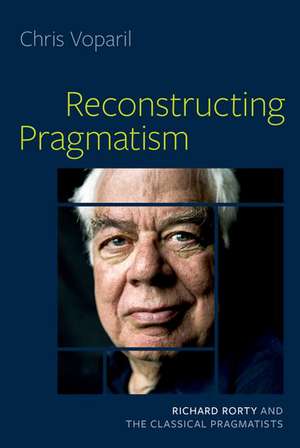Reconstructing Pragmatism: Richard Rorty and the Classical Pragmatists
Autor Chris Voparilen Limba Engleză Hardback – 29 apr 2022
Preț: 438.67 lei
Preț vechi: 486.00 lei
-10% Nou
Puncte Express: 658
Preț estimativ în valută:
83.94€ • 87.86$ • 69.86£
83.94€ • 87.86$ • 69.86£
Carte disponibilă
Livrare economică 27 februarie-05 martie
Preluare comenzi: 021 569.72.76
Specificații
ISBN-13: 9780197605721
ISBN-10: 0197605729
Pagini: 392
Dimensiuni: 152 x 226 x 33 mm
Greutate: 0.57 kg
Editura: Oxford University Press
Colecția OUP USA
Locul publicării:New York, United States
ISBN-10: 0197605729
Pagini: 392
Dimensiuni: 152 x 226 x 33 mm
Greutate: 0.57 kg
Editura: Oxford University Press
Colecția OUP USA
Locul publicării:New York, United States
Recenzii
Voparil has a positively intimidating mastery of Rorty's work and of the voluminous secondary literature on it, and I dissent from his fascinating reconstruction of Rorty with great trepidation. I am far more certain, however, that Rorty scholars and students of the pragmatist tradition alike will learn much from Voparil's Reconstructing Pragmatism
Readers will learn about Rorty's work and about pragmatism and its potential to address the challenges of democratic society. Voparil's focus on pragmatism's commitment to socially just community sidelines an important aspect of Rorty's thought: his provocative endorsement of ironic, Nietzschean self--creation enabled by liberal freedom. Nevertheless, Voparil's book is a tour de force that accomplishes its goal of demonstrating the importance of Rorty and pragmatism.
Richard Rorty renewed themes in James and Dewey, developing them with great sensitivity. This sympathetic study awards him his rightful place as one of the architects of contemporary pragmatism.
This is a smart, well-written book that offers a wealth of fresh insights about Rorty's pragmatism and its relationship to classical pragmatists. Voparil is even-handed and inspiring as he reconstructs Rorty's relationship not only to Dewey, but also to Peirce, James, Addams, and Royce. Refusing both the demonization and the glorification of Rorty's work, Reconstructing Pragmatism demonstrates how the future of contemporary pragmatism can benefit from rather than merely avoid or criticize Rorty's philosophy.
A philosopher can hardly ask for anything more than a careful and sympathetic reader...Rorty at last has a careful and sympathetic reader in Voparil,...Those partial to the classical pragmatists and who regard Rorty as an enfant terrible will be well advised to read Voparil's book.
Readers will learn about Rorty's work and about pragmatism and its potential to address the challenges of democratic society. Voparil's focus on pragmatism's commitment to socially just community sidelines an important aspect of Rorty's thought: his provocative endorsement of ironic, Nietzschean self--creation enabled by liberal freedom. Nevertheless, Voparil's book is a tour de force that accomplishes its goal of demonstrating the importance of Rorty and pragmatism.
Richard Rorty renewed themes in James and Dewey, developing them with great sensitivity. This sympathetic study awards him his rightful place as one of the architects of contemporary pragmatism.
This is a smart, well-written book that offers a wealth of fresh insights about Rorty's pragmatism and its relationship to classical pragmatists. Voparil is even-handed and inspiring as he reconstructs Rorty's relationship not only to Dewey, but also to Peirce, James, Addams, and Royce. Refusing both the demonization and the glorification of Rorty's work, Reconstructing Pragmatism demonstrates how the future of contemporary pragmatism can benefit from rather than merely avoid or criticize Rorty's philosophy.
A philosopher can hardly ask for anything more than a careful and sympathetic reader...Rorty at last has a careful and sympathetic reader in Voparil,...Those partial to the classical pragmatists and who regard Rorty as an enfant terrible will be well advised to read Voparil's book.
Notă biografică
Chris Voparil is on the Graduate Faculty of Union Institute & University, where he teaches philosophy and political theory. He is author of Richard Rorty: Politics and Vision (Rowman & Littlefield, 2006) and co-editor of Pragmatism and Justice (Oxford University Press, 2017) and several collections of Rorty's work, including What Can We Hope For? Essays on Politics (Princeton University Press, 2022), On Philosophers and Philosophy: Unpublished Papers, 1960-2000 (Cambridge University Press, 2020), and The Rorty Reader (Wiley-Blackwell, 2010), in addition to articles on pragmatism.
